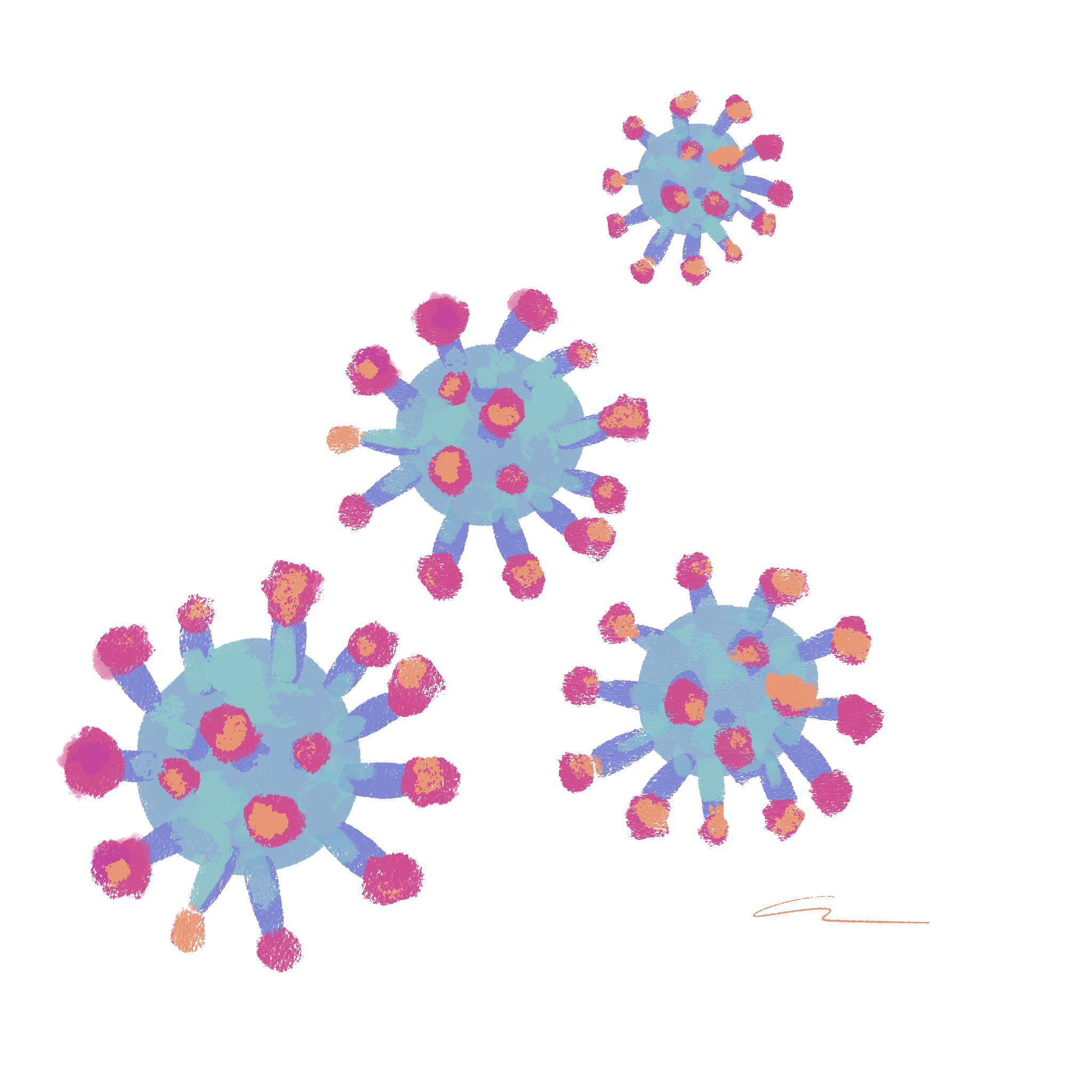Yale researchers discover potential Long COVID causes and treatments
A recent study led by Yale researchers uncovered evidence on how Long COVID affects the body and potential treatments for these symptoms.

Cecilia Lee, Illustrations Editor
Yale researchers discovered that several common medications can be used to improve and treat some of the long-term effects of COVID-19 — known as Long COVID or post-COVID-19 conditions.
A preprint of the new study, which was published online in August, investigates ways to treat symptoms ranging from fatigue and fever to respiratory, heart, neurological and digestive conditions. These symptoms can last more than four weeks or even months after infection. The research team was led by Akiko Iwasaki, professor of immunobiology and molecular, cellular and developmental biology, and Jon Klein MED ’24. Iwasaki’s study discusses two primary findings regarding the body’s T-cells, a key component of the immune system, and Epstein-Barr viral cells, which are one of the most common viruses in the world known for causing mononucleosis.
“The lives of the people with this condition have been turned upside down,” Iwasaki wrote in a statement. “Many of them lost their jobs or had to cut down their work hours. Their stories inspired me to tackle the immunological mechanisms underlying disease pathogenesis. I just wanted to do something to help.”
The researchers studied 215 patients at Yale and Mount Sinai’s Center for Post-COVID Care, which included both a control group and fully recovered COVID-19 patients who were suffering symptoms associated with COVID-19 months and years after infection.
Iwasaki said that there were several challenges when conducting the study, regarding administrative areas like funding, as well as finding an appropriate control cohort of people who had COVID-19 but did not develop any symptoms of Long COVID.
“First challenge was in identifying a clinical partner,” Iwasaki wrote in an email to the News. “I wanted to partner with someone who is an expert on Long COVID and who is compassionate and shares the same values.”
Iwasaki partnered with David Putrino, a neurophysiologist at the Icahn School of Medicine at Mount Sinai who treats thousands of Long COVID patients.
The second challenge, according to Iwasaki, was finding research funds to support her work. She later received funding from the Howard Hughes Medical Institute to carry out her experiments, she said.
The results suggested that T-cells, a key component of the immune system implicated in chronic infections and cancer, were found to be “exhausted” in Long COVID subjects after encountering the same antigens numerous times. According to Iwasaki, this implies that something is triggering these T-cells for extended time periods in the Long COVID patients. The researchers have yet to confirm this but suspect that the SARS-CoV-2 antigen could be the culprit.
Another key finding was that Epstein-Barr viral cells already present in patients’ bodies had been reactivated. EBV is one of the most common viruses in the world and is best known as the cause of mononucleosis. Previously, Epstein-Barr infections have been closely linked to multiple sclerosis diagnoses decades after infection, and Iwasaki suspects that the findings suggest that they may play a similar role in Long COVID.
“Some of the symptoms of Long COVID may actually be a result of the reactivated EBV that can cause a significant number of symptoms on its own, and might therefore be treated with EBV-specific therapies,” Iwasaki said. “Maybe some of the symptoms that they’re experiencing are not from SARS-Cov-2, but rather from EBV.”
Long COVID patients were also found to have especially low cortisol levels, an essential hormone that regulates processes like nutrient handling, as well as glucose level, blood pressure and inflammation reduction. Therefore, the researchers suspect that Long COVID symptoms may also be the result of low cortisol levels.
If EBV and low cortisol levels are the cause of Long COVID systems, the researchers believe that a logical next step is treating these two conditions to provide relief for Long COVID patients. Iwasaki explained that low-dose hydrocortisone could potentially be given to treat low cortisol levels and relieve some of the symptoms. Another study-driven hypothesis is that treating patients with common EBV drugs like Ganciclovir or other antivirals could also provide symptom relief.
“Our team was excited to find biological differences among individuals with Long COVID relative to our three control groups, complementing other changes described in earlier investigations of Long COVID by other groups,” Klein wrote in an email to the News. “Importantly, our study examined individuals with Long COVID more than a year removed from their acute disease who still display notable perturbations to their immune system, which was a surprising outcome given the length of time between acute COVID-19 and enrollment in our study.”
Iwasaki said that the researchers plan to further investigate the pattern of how cortisol levels change in those with Long COVID. Though they detected lower levels of cortisol, the researchers need more information on how cortisol levels change during the day in order to validate all the key findings in independent cohorts. Then, the researchers can test some of the hypotheses that arise from this study.
These findings have important implications for unraveling the underlying pathogenesis of different endotypes, or subtypes of health conditions, of Long COVID. This study encourages scientists to use randomized control trials in the future to investigate promising treatments based on groups of patients, according to Iwasaki.
As of June, 1 in 13 adults in the U.S. have reported Long COVID symptoms, defined as symptoms lasting three or more months after first contracting the virus, and that they didn’t have prior to their COVID-19 infection.







